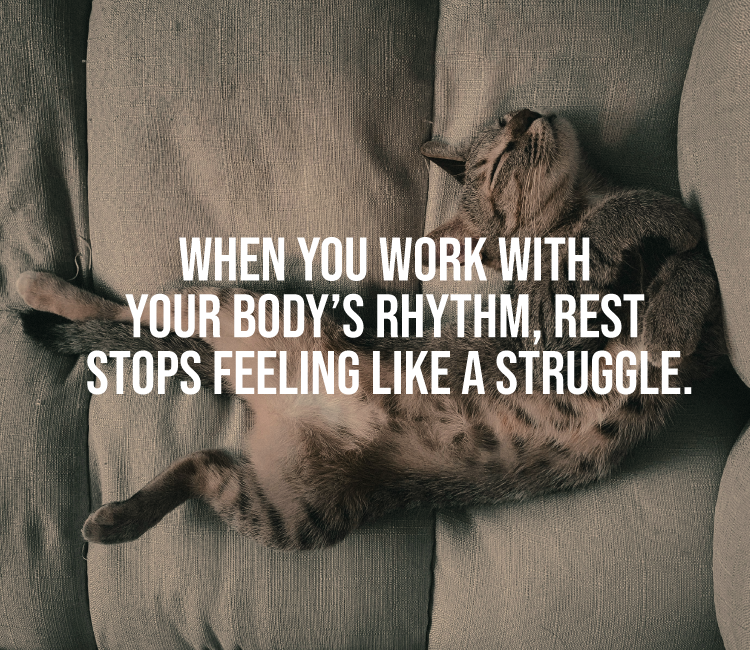
Actionable steps to unlock the secret of your circadian rhythm
Your body runs on an internal clock more precise than any timepiece. This biological rhythm, known as your circadian clock, orchestrates everything from when you feel alert to when you naturally become drowsy. Understanding and working with this rhythm can transform your sleep quality and overall well-being.

Deep within your brain, a cluster of about 20,000 neurons called the suprachiasmatic nucleus (SCN) acts as your master timekeeper. This biological clock operates on roughly a 24-hour cycle, coordinating the release of hormones, fluctuations in body temperature, and shifts in alertness throughout the day.
The magic happens through a carefully choreographed dance of three key players: melatonin, cortisol, and your core body temperature. Each follows a predictable pattern that, when functioning optimally, creates the perfect conditions for both restful sleep and daytime alertness.
Melatonin is your body's natural sleep hormone. As darkness falls, your pineal gland begins releasing melatonin around 9 p.m., with levels peaking between 2 and 4 a.m. This hormone doesn't just make you sleepy—it lowers your core body temperature and blood pressure, preparing your entire system for rest.
Cortisol serves as your biological alarm clock. This stress hormone surges in the early morning hours, typically peaking between 8 and 9 a.m., flooding your system with the energy needed to tackle the day. Throughout the day, cortisol levels gradually decline, reaching their lowest point around midnight.
Body temperature follows its own rhythm, dropping 1 to 2 degrees as bedtime approaches. This temperature dip signals to your brain that it's time to sleep. Your coolest body temperature occurs between 4 and 6 a.m., after which it begins rising to help you wake up naturally.
These processes are tightly regulated, but modern life often disrupts them. Let’s explore the factors that impact your circadian rhythm and how you can use this knowledge to sleep better.

Light exposure acts as the primary synchronizer of your circadian rhythm. Your eyes contain specialized cells that detect light and send signals directly to your SCN, essentially telling your brain what time it is.
Morning sunlight exposure within the first hour of waking is crucial for setting your circadian clock. This bright light suppresses any remaining melatonin production and kickstarts your cortisol release, creating clear boundaries between night and day. Even 15 to 20 minutes of morning sunlight can significantly improve your sleep quality that night.
Conversely, bright light exposure in the evening confuses your internal clock. Blue light from screens is particularly disruptive because it closely mimics daylight, tricking your brain into thinking it's still daytime and suppressing melatonin production by up to 50%.
A few easy to follow tips: Get outside during the day, especially in the morning, to anchor your circadian rhythm. Reduce blue light exposure in the evening by dimming lights, using blue-light-blocking glasses, or enabling night mode on your devices.
Your digestive system operates on its own circadian rhythm, closely linked to your master clock. Eating large meals late in the evening forces your digestive system to work when it naturally wants to rest, disrupting both sleep quality and metabolic processes.
Research shows that eating your largest meal earlier in the day and finishing your last meal at least 3 hours before bedtime helps maintain proper circadian alignment. Late-night eating can shift your internal clock, making it harder to fall asleep and reducing the quality of your rest.
Caffeine presents another timing challenge. With a half-life of 6 to 8 hours, that afternoon coffee can still be affecting your system at bedtime, blocking adenosine receptors that signal sleepiness and interfering with your natural melatonin release.
Word to the wise: Eat your last meal at least 2 to 3 hours before bedtime. Avoid heavy or sugary meals close to bedtime as they can spike your blood sugar, leading to restless sleep. Lastly, choose foods rich in tryptophan (like turkey, nuts, and dairy), which can help boost melatonin production.

Physical activity powerfully influences your circadian rhythm, but timing matters enormously. Morning or afternoon exercise can advance your circadian clock, helping you feel sleepy earlier in the evening. However, vigorous exercise within 3 to 4 hours of bedtime can be counterproductive.
In fact, exercise raises your core body temperature, and your body needs time to cool down before sleep becomes possible. Since your natural temperature drop is one of the strongest sleep cues, exercising too late can delay this process and push back your bedtime.
Pro suggestions: Aim for moderate exercise earlier in the day to promote better sleep at night. Engaging in gentle activities like yoga or stretching in the evening can help your body transition into a restful state.
Electronic devices emit blue light that directly interferes with melatonin production. Studies show that using devices for just 2 hours before bedtime can suppress melatonin by 20-25% and delay sleep onset by over an hour.
The content you consume also matters. Stimulating or stressful content can trigger cortisol release at the wrong time, creating a state of alertness when your body should be winding down.
News you can use: Set a digital curfew at least 30 to 60 minutes before bedtime. Next up, replace screen time with relaxing activities like reading a book, meditating, or listening to calming music.

When your circadian rhythm is off, you might experience difficulty falling asleep, waking up frequently during the night, or feeling tired during the day. Chronic misalignment can lead to more serious health issues, including metabolic disorders, depression, and weakened immunity. Restoring your natural rhythm doesn’t require an overhaul of your life. Small, consistent adjustments can make a big difference.
To optimize your sleep, create consistent patterns that support your natural rhythms. Expose yourself to bright light early in the day, dim lights in the evening, eat your largest meals earlier, and establish a regular sleep schedule. Your circadian clock thrives on consistency—even weekend sleep-ins can disrupt your rhythm for days.
Understanding your natural rhythm isn't about following rigid rules, but about recognizing the sophisticated biological processes that govern your sleep and wake cycles. When you align your daily habits with these natural patterns, better sleep becomes not just possible, but inevitable.

I’ve spent decades chasing excellence and MAKE Wellness helps me sustain it with strength, clarify and recovery.
read
Reset your day with simple habits from MAKE Wellness. Small shifts can support a calmer, more focused mind, helping you balance energy and productivity.
read
Stay present and mentally clear this summer with 3 tips from MAKE Wellness. Support focus, energy, and balance with movement and mindful practices daily.
read